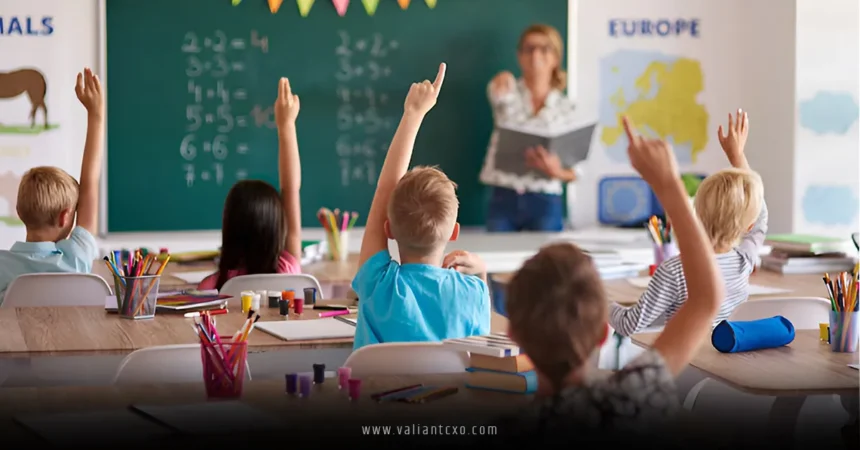School The Foundation
School is more than just a building with classrooms and chalkboards—it’s a vibrant ecosystem where young minds are shaped, friendships are forged, and futures are built. From the first day of kindergarten to the triumphant walk across the graduation stage, school plays a pivotal role in personal and academic development. But what makes school such a cornerstone of society? Why does it hold such a special place in our hearts and memories? In this article, we’ll dive deep into the multifaceted world of school, exploring its purpose, evolution, challenges, and impact on students and communities. With a conversational tone and a sprinkle of nostalgia, let’s unpack why school remains a timeless institution.
What Is the Purpose of School?
School isn’t just about memorizing multiplication tables or reciting Shakespeare (though those are pretty cool too). At its core, school is designed to equip students with the knowledge, skills, and values they need to thrive in an ever-changing world. Think of school as a launchpad—a place where curiosity is sparked, critical thinking is honed, and dreams start taking shape.
Academic Foundations: Building Blocks for Success
Every school’s mission begins with academics. From learning to read and write to mastering complex subjects like physics or literature, school provides the foundational knowledge that sets students up for future careers. But it’s not just about facts and figures. Schools teach students how to think—how to analyze, question, and solve problems. Ever wonder why algebra feels like a puzzle? That’s school subtly training your brain to tackle challenges logically.
Beyond core subjects like math, science, and language arts, schools introduce students to diverse fields like history, art, and technology. This broad exposure helps kids discover their passions. Maybe you were the kid who loved dissecting frogs in biology class or the one who couldn’t wait to paint in art. School gives you the chance to explore those interests in a structured yet creative environment.
Social Skills: Learning to Connect
School is also a social hub. It’s where kids learn to share, collaborate, and navigate the complexities of human relationships. Remember those group projects that felt like herding cats? They weren’t just about the poster board—they were about teamwork, communication, and compromise. Schools create a microcosm of society, teaching students how to interact with peers, teachers, and authority figures. These lessons are just as critical as academic ones, shaping how we build relationships later in life.
Character Development: Values That Last a Lifetime
Beyond academics and social skills, school instills values like responsibility, respect, and resilience. Whether it’s showing up on time for class, helping a struggling classmate, or bouncing back from a bad grade, school is a training ground for life’s ups and downs. It’s where you learn that effort matters, mistakes are okay, and perseverance pays off. In a way, school is like a life coach, guiding you through the messy but rewarding process of growing up.
The Evolution of School: From One-Room Schoolhouses to Digital Classrooms
School The Foundation : School hasn’t always looked like the modern campuses we know today. The concept of school has evolved dramatically over centuries, adapting to societal changes, technological advancements, and shifting educational philosophies. Let’s take a stroll down memory lane to see how school has transformed.
The Early Days: A Simpler School Experience
School The Foundation : Picture a one-room schoolhouse in the 1800s, with kids of all ages gathered around a single teacher. Back then, school was a luxury for many, with a focus on basic literacy and arithmetic. The curriculum was straightforward, and resources were scarce—think slate boards and a handful of books. Yet, these early schools laid the groundwork for universal education, making learning accessible to more people than ever before.
The Industrial Era: Standardizing School Systems
School The Foundation : As the world industrialized, so did education. By the early 20th century, schools became more structured, with standardized curricula and grade levels. The goal? Prepare students for a workforce that demanded efficiency and specialization. School became a pipeline to jobs, emphasizing discipline and uniformity. Sound familiar? It’s why we still have bells signaling the end of class—like a factory whistle calling workers to the next shift.
The Digital Age: School in the 21st Century
School The Foundation : Fast forward to today, and school looks like a sci-fi movie compared to those early days. Classrooms are equipped with smartboards, students use laptops for assignments, and virtual learning has become a game-changer. The rise of online education platforms, like Khan Academy, has made school more flexible and accessible. Whether it’s a rural student joining a virtual class or a homeschooler accessing advanced courses, technology has redefined what school can be.
But it’s not just about gadgets. Modern schools emphasize critical thinking, creativity, and adaptability—skills needed in a world driven by innovation. Coding classes, robotics clubs, and environmental science projects are now staples in many schools, reflecting the demands of a tech-savvy, interconnected world.
The Challenges of School: Navigating the Hurdles
School The Foundation : School isn’t all rainbows and report cards. It comes with its share of challenges, from academic pressure to social dynamics. Understanding these hurdles can help us appreciate the resilience it takes to thrive in a school environment.
Academic Pressure: The Weight of Expectations
School The Foundation : Raise your hand if you’ve ever stressed about a big test or a looming deadline (we’ve all been there). Schools can be pressure cookers, with students juggling homework, exams, and extracurriculars. While this prepares kids for real-world responsibilities, it can also lead to burnout or anxiety. The key is balance—schools are increasingly incorporating mindfulness programs and flexible grading systems to ease the load. Still, finding that sweet spot between rigor and well-being is an ongoing challenge.
Social Struggles: Fitting In and Standing Out
School The Foundation : School is a social jungle. For every lifelong friendship formed, there’s a clique to navigate or a bully to avoid. Peer pressure, self-esteem issues, and the quest to “fit in” can make school feel like a reality show. Teachers and counselors play a crucial role here, fostering inclusive environments where every student feels valued. Programs like StopBullying.gov provide resources to help schools create safe spaces for all students.
Equity and Access: Bridging the Gap
School The Foundation : Not every school is created equal. Disparities in funding, resources, and teacher quality can create uneven experiences for students. Rural schools might lack access to advanced courses, while underfunded urban schools may struggle with overcrowded classrooms. Addressing these inequities is a priority for educators and policymakers, with initiatives like Edutopia showcasing innovative solutions to make school more equitable for everyone.
The Impact of School on Individuals and Society
School The Foundation : School doesn’t just shape individuals—it shapes the world. From producing the next generation of leaders to driving societal progress, the ripple effects of school are profound.
Personal Growth: Discovering Who You Are
School is where you figure out who you are and who you want to be. It’s where you discover your love for writing, your knack for numbers, or your passion for helping others. Through clubs, sports, and electives, school offers a safe space to experiment with identities and interests. Ever joined a debate team and realized you’re a natural-born arguer? Or maybe a science fair project sparked a lifelong love for discovery. School is the stage for those “aha” moments.
Economic Benefits: School as a Career Springboard
Let’s talk dollars and sense. A solid school education opens doors to better job opportunities and higher earning potential. Studies consistently show that high school graduates earn more than non-graduates, and college degrees amplify that gap. School equips students with the skills employers value, from technical expertise to soft skills like communication and teamwork. It’s like an investment in your future paycheck.
Societal Progress: Schools as Community Pillars
Schools aren’t just for students—they’re community hubs. They host events, provide resources, and foster civic engagement. Think about it: school bake sales, parent-teacher associations, and local sports teams all strengthen community ties. On a larger scale, schools produce informed citizens who vote, innovate, and solve global challenges. In a way, school is the glue that holds society together, nurturing the minds that will shape tomorrow.
The Future of School: What Lies Ahead?
As we look to the future, school is poised for even more transformation. What will the classroom of 2050 look like? Will robots replace teachers? (Spoiler: probably not.) Here’s a glimpse of what’s on the horizon.
Personalized Learning: Tailoring School to Every Student
Imagine a school where every student has a customized learning plan, tailored to their strengths and interests. Thanks to advancements in artificial intelligence and data analytics, this is becoming a reality. Adaptive learning platforms can adjust lessons in real time, ensuring no student is left behind. Schools are also embracing project-based learning, where students tackle real-world problems, making school feel less like a chore and more like an adventure.
Global Connections: School Without Borders
The internet has made the world smaller, and schools are catching up. Virtual exchange programs, online collaborations, and global curricula are connecting students across continents. A student in New York can work on a project with peers in Tokyo, broadening perspectives and fostering cultural understanding. School is no longer confined to four walls—it’s a global village.
Lifelong Learning: School Beyond the Classroom
The idea of school as a one-and-done experience is fading. In a world where skills evolve rapidly, lifelong learning is the name of the game. Schools are starting to prepare students for continuous education, teaching them how to learn independently. Whether it’s taking an online course or attending a workshop, the school of the future encourages a mindset of growth and adaptability.
Conclusion: School The Foundation – Why School Matters
School is more than a place—it’s a journey. It’s where you learn to read, to dream, to fail, and to try again. From building academic foundations to fostering friendships and values, school shapes who we are and who we become. Despite its challenges, school remains a cornerstone of personal growth and societal progress. So, whether you’re a student, parent, or educator, embrace the magic of school. It’s a messy, beautiful, transformative experience that prepares us for the adventure of life. Let’s keep learning, growing, and making memories in the halls of school.
FAQs About School
1. Why is school important for a child’s development?
School provides a structured environment where kids gain academic knowledge, social skills, and values like responsibility and teamwork, setting them up for success in life.
2. How has technology changed the way school operates?
Technology has transformed school with tools like smartboards, online classes, and personalized learning platforms, making education more accessible and engaging.
3. What can parents do to support their child’s school experience?
Parents can stay involved by communicating with teachers, encouraging a love for learning, and helping kids manage stress and balance school responsibilities.
4. How can schools address issues like bullying?
Schools can foster inclusive environments, implement anti-bullying programs, and train staff to recognize and address bullying, ensuring a safe space for all students.
5. What does the future of school look like?
The future of school includes personalized learning, global connections, and a focus on lifelong learning, adapting to the needs of a rapidly changing world.
For More Updates !! : valiantcxo.com


